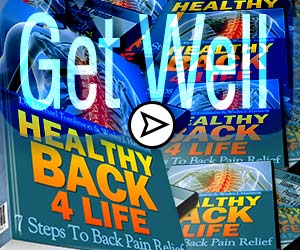Doc, What's Wrong With Me?
The Number One Question I Am Asked Most back or neck pain conditions can be divided into 2 main groups: Acute pain and chronic pain. We then look at subgroups to find the most likely fit (Actual Clinical Back Pain Classifications are listed below).
Most back or neck pain conditions can be divided into 2 main groups: Acute pain and chronic pain. We then look at subgroups to find the most likely fit (Actual Clinical Back Pain Classifications are listed below).
Although the origin or root cause of your back pain can be very difficult for your physician to accurately diagnose or even be considered non specificback pain, as is frequently the case, it is important for the layperson (patient) to have an idea of some key information and terms related to the physical component of true health and wellness.
The physical component is composed of the body and the mind; it is both structure and function. The spine is anintricate and complex neuro-musculo-skeletal system; it is composed of bones, nerves, ligaments, muscles and cartilage, all of which we will soon discuss ingreater detail.
So with all of the individual components and the intricate complexity of the region the exact condition causing the pain can often be difficult to pinpoint. A single injury or condition can create numerous symptoms and have the potential for numerous possible diagnoses. Because of this it can be difficult for a patient to get a definitive diagnosis from their own doctor about the source or exact cause of their back pain. In addition there are varying terms that are used in an interrelated manner by different medical doctors, chiropractors, osteopaths and orthopedic specialists.
Some doctors may say there is a pinched nerve, or a nerve root irritation, some doctors say a vertebrae is out of alignment, or that you have a subluxation, other physicians may say a slipped disc, a bulging disc, a herniated disc or even a ruptured disc, all these words can be used in describing a problem.
It depends on the individual doctor’s precision with language as they can be discussing different problems or the exact same problems – it is no wonder that a patient may be confused about their diagnosis and therefore extremely uncertain of the best course of treatment to resolve their problem or problems with such confusion in terminology.
We look at your case history-rays, MRI’s, physical exam findings and frequently work with your MD, and radiologist to get a clear diagnosis of why you hurt. We do our best to not just chase the symptoms but actually find the root cause of your problem. Our goal is to help you get well and stay well
CLINICAL BACK PAIN CLASSIFICATIONS
• ACUTE: 6 weeks or less of symptoms: Sprain/Strain, Herniated Disc, Sciatica
• SUB-ACUTE: 7 – 12 weeks of symptoms
• CHRONIC RECURRENT: episodes of pain lasting less than 12 weeks with significant pain-free intervals
• CHRONIC PERSISTENT: pain lasting longer than 12 weeks without any significant pain-free intervals, Spinal Stenosis, Degenerative Disc, Spinal Osteoarthritis
Conditions Symptoms Diagnosis
ACUTE
Acute Rapid onset clinical history/findings
Sprain/ of pain Decreased ROM
Strain Often related to injury x-ray
Back pain dominant
No numbness/weakness
_______________________________________________________________________________
Conditions Symptoms Diagnosis
Disc
Herniation/ Rapid onset of clinical history/findings
Bulge Back pain & MRI
Radiating EMG tests Leg
Pain
Often related to injury
Predominate leg pain
Possible numbness/
Or weakness legs
__________________________________________________________________________________
Conditions Symptoms Diagnosis
Sciatica Rapid onset of clinical history/findings
Back pain & MRI
Radiating EMG tests
Leg Pain
Often related to injury
Predominate leg pain
Possible numbness/
Or weakness legs
—————————————————————————————
Conditions Symptoms Diagnosis
Chronic
Chronic
Recurrent back pain with clinical history/
Pain some pain findings
Free periods X-rays
____________________________________________________________________________________
Conditions Symptoms Diagnosis
Chronic Prolonged recovery clinical history/
Persistent from acute attack findings
Pain Frequent reoccurrence x-rays/MRI
Limited or no pain free bone/ CT scan
Periods
____________________________________________________________________________________
Conditions Symptoms Diagnosis
Disc Middle Age x-rays
Degeneration Heavy lifting, CT scan/MRI
Vibration discography
Typically back-dominant pain
Overweight
Smoking
Pain worse with flexion
____________________________________________________________________________________
Conditions Symptoms Diagnosis
Chronic
Spinal Common over age 50 x-rays
Osteoarthritis Rarely symptomatic CT scan
Most arthritis on X-rays bone scan
is not related to pain blood tests
Aching back pain
Often worse with extension
———————————————————————————
Conditions Symptoms Diagnosis
Spinal Back pain increasing clinical history/
Stenosis with walking symptoms
Leg pain/numbness CT scan/MRI
associated with walking (+) Valsalva’s
Weakness/clumsiness in legs
Symptoms eased by flexing forward
————————————————————————–
Conditions Symptoms Diagnosis
Tension Back pain after activity Clinical history/
Myositis spasm & tightness symptoms
Syndrome



